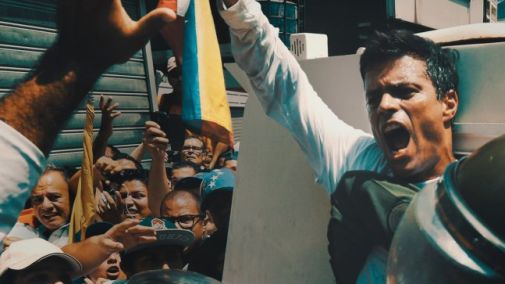By Glenn Dunks

It’s funny, isn’t it? The subjects that become popular in non-fiction (and film more broadly, I suppose). The ongoing civil war in Syria was surely the most prominent subject of the 2010s while many other global conflicts remained relatively unexamined. This decade has begun with multiple films about Hong Kong. Venezuela is a country that has been discussed a lot in erroneous right-wing viral memes about the pitfalls of socialism, but strangely has made little impact on filmmakers beyond last year’s Oscar qualifying documentary Once Upon a Time in Venezuela, which I reviewed here.
A la calle (In the Streets) embeds the viewer deeper into the fractious political situation than that 2020 title. Maxx Caicedo and Nelson G. Navarrete’s film gets up close and personal within the protests, the political turmoil and the familial anguish that has engulfed the Central American nation now for years.
Depending on your understanding of what’s happening there (or your patience for exposition), you may find A la calle’s lack of greater context frustrating or refreshing. Even without a broader knowledge of how Venezuela went from one of the richest nations to one of the poorest (mismanagement for the most part; dependant as they were on oil prices remaining sky-high), and despite the often chaotic action that unfolds across multiple subject narratives, the story here is relatively easy to follow. Venezuela has descended into a state where some 80% are living impoverished. A single plantain is ridiculously expensive due to hyperinflation and a lack of agricultural independence, educated men dive in sewage in the hopes of finding valuables at the bottom of filthy rivers, and politicians on the opposite side to President Nicolas Maduro are jailed under flimsy charges of incitement.

Amid its often-frenetic scenes of activism and protest, several individuals become etched into the narrative. A female medical student who supports her community where she can; a young activist who, in one of the film’s more tender moments, brings the surprise of butter to his mother; a man who must emigrate to support his family; while most importantly Leopoldo Lopez upon his release as a political prisoner continues to fight against the authoritarian regime that put him there. While never overly flashy, the editing of Marcus Cheek, Michael Gleaton, Yesenia Higuera and Nelson G. Navarrete effectively spins these stories within the larger context of a nation on fire. The dire situation that Venezuela finds itself in is shown in uncompromising fashion, but with the addition of a sweeping sense of hope that the revolution will come if they fight in the streets just one day more (even if the end-credits dash it away).
Venezuela has enough problems as it is without having to deal with the idiocy of some who like to lay its misfortunes solely at the feet of socialism for anti-progressive brownie points. There are plenty more movies to be told out of what’s happening there and A la calle certainly can’t represent them all, but it is a film that could hopefully mean less memes and more understanding.
Release: A la calle will be streaming on HBO Max from 15 September.
Oscar chances: Probably slim due to its lower profile, but you never know where the whims of the doc branch will take you. These types of films can emerge through a pocket of attention due to their political potency (See Jehane Noujaim's The Square for example). Given Venezuela selected Once Upon a Time in Venezuela as its international film contender last year, maybe they will once again choose a documentary.